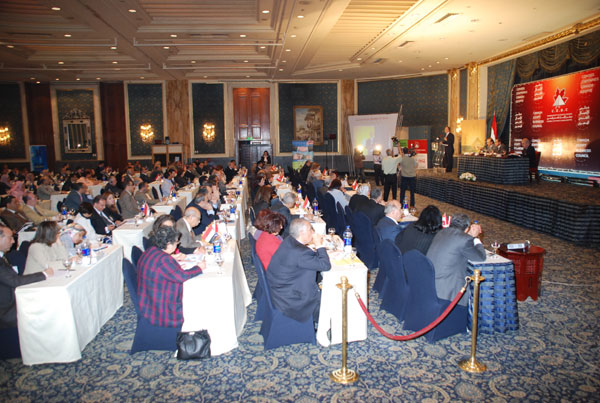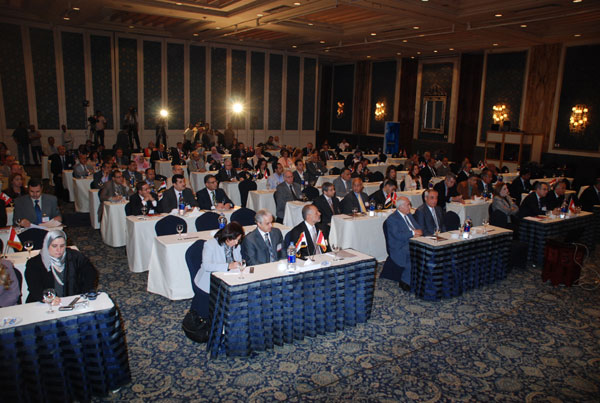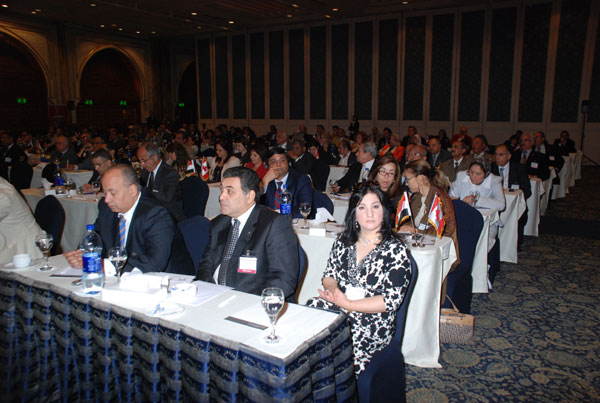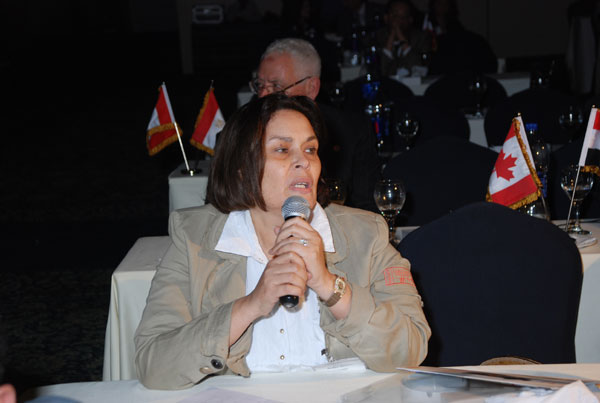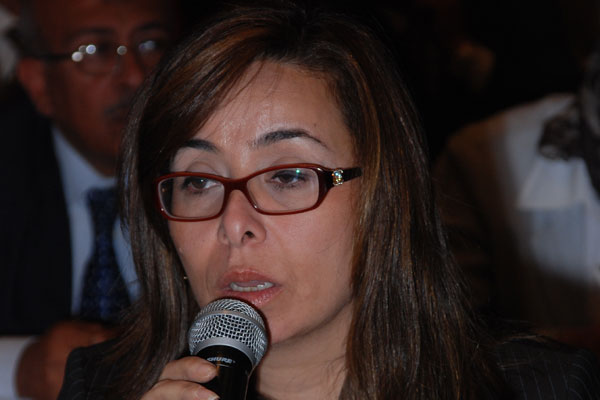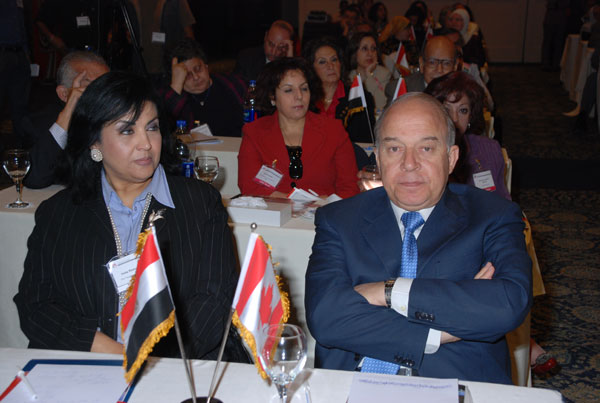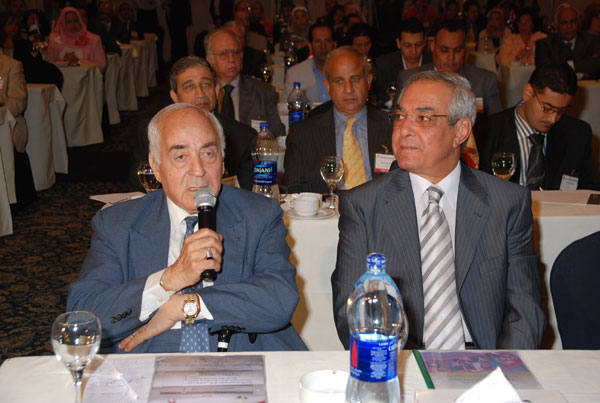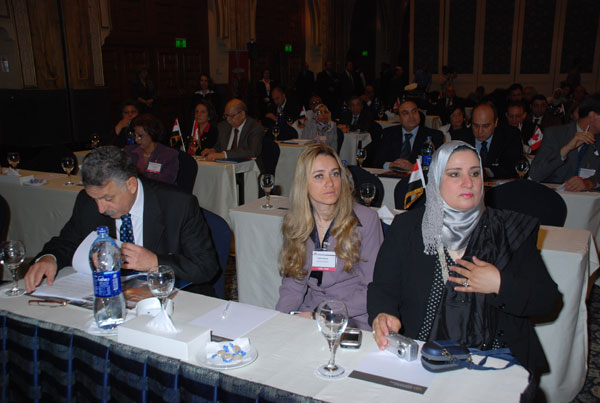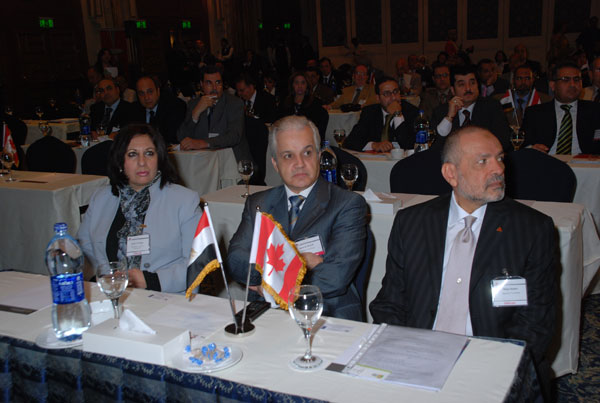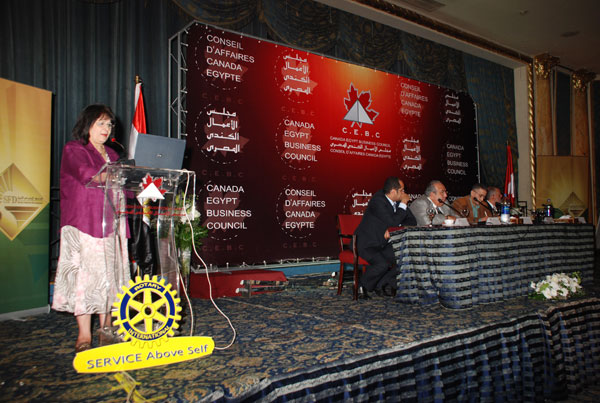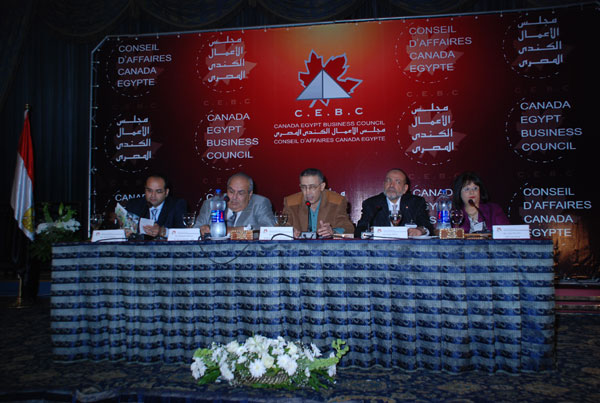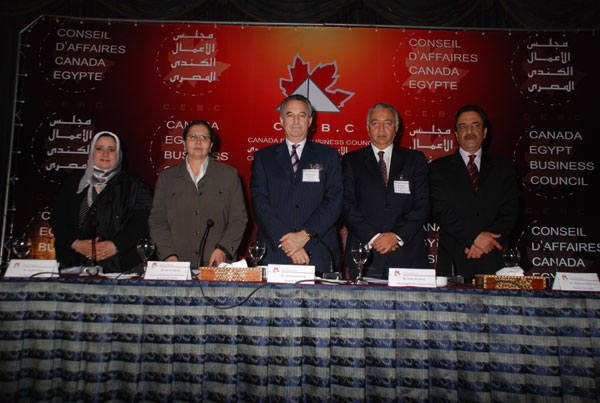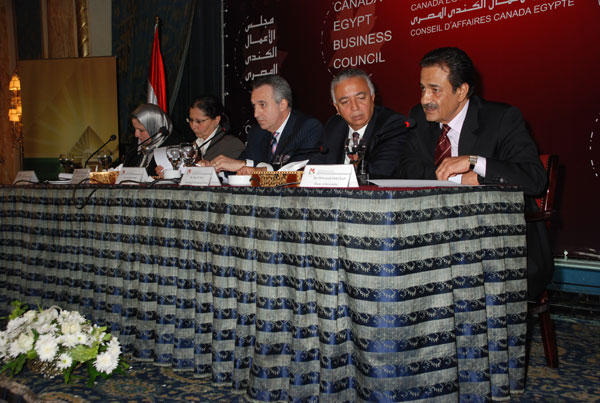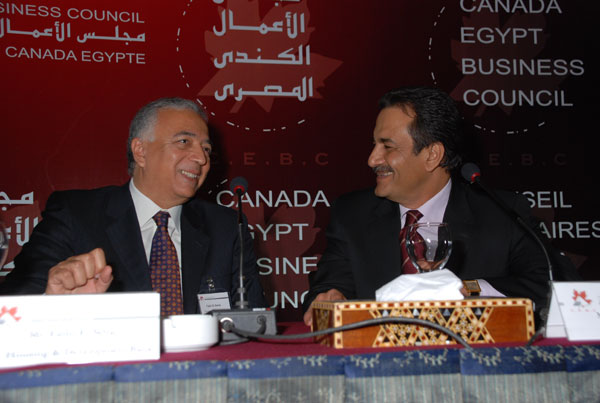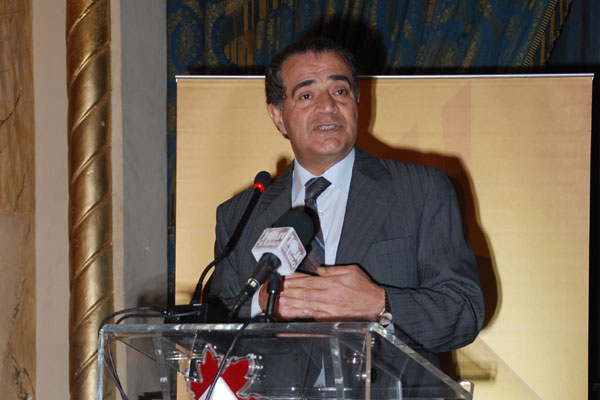
Date
Speaker(s)
Designation
Description
In an attempt to activate the social security network in the Egyptian society, The Canada Egypt Business Council (CEBC) in cooperation with the Social Fund for Development (SFD) jointly with the support of the United Nations Development Program (UNDP), Canadian International Development Agency (CIDA), The World Bank and The Rotary – 2450, organized a one-day conference on Monday April 14th, at the Semiramis Intercontinental Hotel in Cairo. Held under the theme “The Responsibility of the Egyptian Society towards Low Income”, the three sessions’ conference drew a capacity crowd of more than 200 CEBC members and distinguished guests including a number of high-profile cabinet ministers, ambassadors and officials.
Mr. Motaz Raslan, CEBC Chairman began his opening remarks outlining the general concept of social responsibility and its importance in the economic system. Mr. Raslan focused on the definition of low-income people especially in the presence of the prevailing divergent definitions stated by international and local institutions and the urge to approve this definition with the reality and needs of the Egyptian community. He also stressed on the significance of adopting integrated social policies and strategies that involve all communities of the Egyptian society together with economic policies implemented by the government, aiming at deepening the concept of a free market. “The main features and foundations for these social policies, are the human development and the provision of job opportunities that can provide basic services needed by the Egyptian society, particularly the poor segments without compromising the quality of these basic services, which are the health, education and infrastructure”, Added Mr. Raslan.
Mr. Raslan emphasized on the urgency to activate the role of civil society to alleviate high prices and the negative impacts of globalization and changes in world prices by calling for the establishment of a private fund managed by civil society and economic organizations to be spent on projects serving low-income and poor families in Egypt. Mr. Raslan further discussed the need of changing the philosophy and perception of social responsibility of the private sector, especially businessmen so as not to become an example of a donation or a gift, but stems as a national economic and a social duty towards the community. “This change would lead to strengthen the social ties and help sustain the success of large and small projects and thereby ensuring equitable distribution of the fruits of growth, development of all segments of society and achieve the goals of social justice and the effective participation in development”, Said Mr. Raslan.
Mr. Raslan then introduced and welcomed H.E. Ali Moselhy, Egypt’s Minister of Social Solidarity who began his keynote speech by noting that achieving sustainability of social policies requires several features as the need for human capacity building through education and training to provide the appropriate needs of the labor market and ensure job creation which can alter the values prevailing in Egyptian workers and social culture of work in general, both by employers or workers. Minister Moselhy then explained that his ministry has worked in joint efforts with other governmental sectors in cooperating civil society and NGOs to formulate an accurate database about poverty in Egypt and emphasizing social responsibility among the private sector.
Central to this endeavor, the minister elaborated the importance of reforming the legislative system through the creation of flexible and updated corporate entities that can provide the needed aid to the low income people and turn them into active participants in the society in general.
Finally Minister Moselhy stressed on the role of the ministry in decentralization and activation of the role of the governorates to participate in social responsibility as each state has its own economic and social nature of private entities and are better able to identify priorities and to take a connecting link between civil society members, the central government and residents of these provinces. “This was done through implementing surveys and field researches on the characteristics of Egyptian families in order to acquire different degrees of variation of social development work required leading to real stability and social peace in the Egyptian society”, Said the Minister.
The second keynote speaker was Mr. Hani Seif E-Nasr, Managing Director of the Social Fund for Development (SFD) who started by describing the organization’s role in social responsibility. The SFD is currently supporting the small and micro enterprise projects (SMEs) nationwide through the facilitation of loans. As many banks refrain from lending to the poor, the SFD fulfills its mission of poverty alleviation in a collaborative guarantee model where the projects credit company guarantees 80 percent of the loan, banks guarantee 10 percent and the SFD guarantees 10 percent. “As our role to support ‘the poorest of the poor’ the SFD is very involved in projects to improve infrastructure, build roads, undertake health and environmental projects, leading to improve the standard of living and economy in Egypt. He mentioned that the SFD has established 830,000 projects providing 2 million job opportunities and upon which 30% of these projects exports their products abroad.
Mr. Seif El Nasr believes that it is the duty of the business community to play a leading role in serving the poor communities where they operate. Accordingly, the SFD includes the private sector as a key stakeholder in its organizational structure, offering loans, training and capacity-building opportunities that companies can incorporate in the social community activities.
During his speech, The UNDP Country Director, Mr. Mounir Tabet explained the role of Civil Society Organizations (CSOs) in development and institutional reform, decentralization, poverty alleviation and the environment. “Our hope is that such discussions can shed light on different means by which CSOs can positively contribute to the various sectors including education, health, sanitation and housing”, Added Mr. Thabet. He also stressed on the importance of working within the framework of the UN Millennium Development Goals (MDGs) and that he believes that Egypt will be able to fulfill most of these goals by year 2015.
Following the key note speakers’ speeches, the first session entitled,
” Financing Mechanisms for low-income”, tackled a number of barriers hindering the development of social justice in the Egyptian society. The speakers noted that one of the major barriers is that the Support System applied in Egypt in general does not function efficiently in terms of outreach to low-income people since a large percentage of support, more than 50%, with an amount of more than 80 billion pounds does not reach low-income people, but serves other categories. Furthermore it was noted that differentiations must be made between low-income financing mechanisms offered by banks and mechanisms for combating extreme poverty, which is not the function of banks available, but the remaining task of the banks in trying to integrate the poor in available funding mechanisms for projects and not to treat the problem of extreme poverty, which mainly needs social policies to provide basic services to this category. This session’s speakers were Mr. Fathy El Sebai, Chairman, Housing and Development Bank, Mr. Mahmoud Abdel Latif, Chairman and CEO, Bank of Alexandria, Mr. Mohamed Ozalp Vice Chairman, Banque Misr, Dr. Alia El Mahdy, Director, Center of Economic and Financial Research and Studies, Cairo University and Ms. Naglaa Zikry, Deputy Editor-in-Chief, Al Ahram Newspaper as the session’s moderator.
The second session discussed the topic of “The Social responsibility of the private sector towards low-income” and aimed to review some successful experiences and applicable lessons of the private sector and civil society in upgrading low-income people through charities established for this purpose. Speakers added that there are concrete effective models in social development practices in Egypt, one of which are the successful activities of the Rotary clubs and the Food Bank showing that success in social responsibility requires solidarity efforts with all parties to the Government, other community civil organizations as well as the private sector. They also stressed on the importance of investing and exploring the field of handcrafts, where the majority of poor and low-income people work. Reaching out to them would be impossible without the help of the civil society together with the government’s support in order to promote awareness and public education importance among them aiming to better elevate their standard of living. This session’s speakers were Mr. Mohamed Delawar, Past Governor of Rotary, Mr. Niazy Sallam, Chairman, Egyptian Food Bank, Ms. Laila Iskandar, Chairperson, CID Consulting, Mr. Khaled Hegazy, External Relations Manager, Procter and Gamble Egypt and was moderated by Mr. Mesbah Kotb, Head of the Economic Section in Al Masry Al Youm Newspaper.
The Closing and Wrap-up session discussed the issue of “The Government’s Plans to improve the Living Standards of low-income”, the speakers pointed out the plans and various tools used by the government to upgrade low-income’s living standard, in addition to highlighting some of the obstacles that hinder the implementation of the upgrading process. One of the main obstacles is the speedy growing poverty a result of several reasons including the glaring inequalities in incomes and the irrational consumption patterns, as well as the lack of market discipline led by the spread of monopolistic practices. Adding that despite the efforts made by the Government to provide support and financial assistance, for 850 thousand families monthly and other offset support for commodities, that reached 20 billion pounds and the expected increase of this support to 128 pounds in 2008-2009 budget, in addition to the government energy support, which reached the 60 billion pounds, however the presence of integrated policies and laws that are basically socially-oriented is still highly needed. The last session was headed by H.E. Osman M.Osman, Minister of State for Economic Development, Dr. Mostafa Elsaid, Head of the Economic Committee in the Egyptian Parliament, Mr. Mounir Abdel Nour, Secretary General, Al Wafd Party and moderated by Mr. Saad Hagras, Managing Editor, Al Alam Al Youm Newspaper.
In conclusion, there were several recommendations raised by the conference contributors and speakers, including the need to establish a mechanism to coordinate charitable projects and social practices of the private sector towards low-income people to bear the fruit of social responsibility. Also the need of establishing an institution subject to the highest political authority for the purpose of combating poverty, in addition to working on launching national projects to overcome the problems facing low-income people. Another final proposal was the application of marketing techniques that can evaluate and increase the awareness of the social role of the private sector through the media leading to the activation of the coordinated efforts of the government, business community and civil society towards the welfare of the Egyptian society.
This conference would have been unattainable without the help of the civil society and the business sector.


